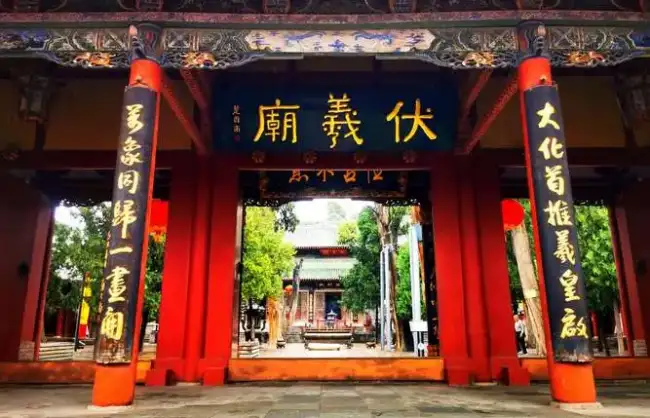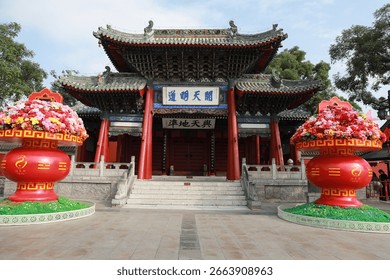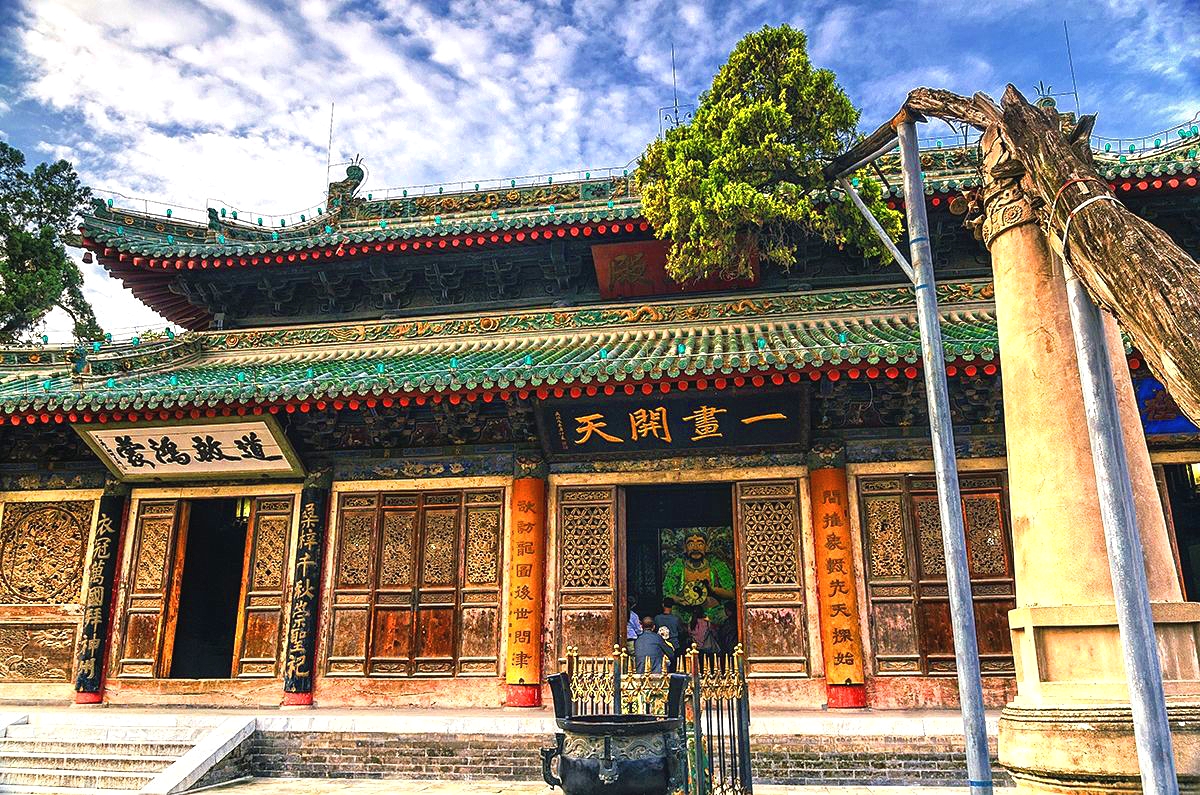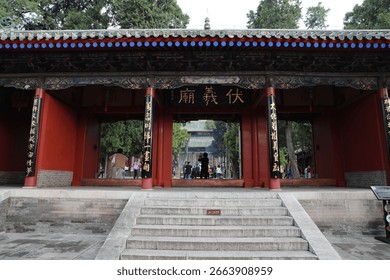Explore Tianshui Fuxi Temple: A Hidden Gem in Gansu Province

An Essential Guide to Visiting Tianshui Fuxi Temple
Tucked away in the scenic landscapes of Gansu Province, Tianshui Fuxi Temple serves as a magnificent gateway to ancient Chinese mythology and culture. This revered site, dedicated to Fuxi—China’s legendary first ruler—offers visitors an enchanting blend of history, architecture, and spirituality. As you step through its grand gates, you’ll be transported into a world where the tales of creation, philosophy, and ancestral worship come alive. The temple’s intricate Ming Dynasty architecture, surrounded by ancient cypress trees and serene courtyards, beckons travelers to explore its rich heritage.
Whether you are an avid history enthusiast or a curious wanderer, Fuxi Temple invites you to immerse yourself in the stories etched within its walls. From the impressive Grand Hall, which houses a statue of Fuxi holding the Eight Trigrams, to the tranquil beauty of the sacred grove, every corner of this temple complex reveals layers of significance and artistry. As you meander through the temple’s 76 buildings, you’ll uncover not only the myths that shaped Chinese civilization but also the enduring traditions that continue to thrive in this vibrant cultural setting.
Join us as we embark on an essential journey through Tianshui Fuxi Temple, a site where the past resonates with the present, and every moment offers a deeper understanding of the values that have shaped Chinese society for millennia.
In This Guide
- An Essential Guide to Visiting Tianshui Fuxi Temple
- The Rich History and Legends of Tianshui Fuxi Temple
- Main Highlights: What You Absolutely Can’t Miss
- Planning Your Visit: A Practical Guide
- Tickets: Prices, Booking, and Tips
- How to Get There: A Complete Transportation Guide
- Local Cuisine and Accommodation Nearby
- Frequently Asked Questions
- Final Thoughts on Your Trip
The Rich History and Legends of Tianshui Fuxi Temple
Tianshui Fuxi Temple, a remarkable cultural landmark in Gansu Province, is far more than a mere collection of historic buildings; it is a vibrant echo of the myths and traditions that have shaped Chinese civilization for millennia. Dedicated to Fuxi, the legendary first emperor of China and a pivotal figure in Chinese mythology, this temple serves as a testament to the deep roots of Chinese culture, philosophy, and spirituality.
Constructed during the Ming Dynasty, Fuxi Temple showcases the architectural grandeur characteristic of that era. The temple complex is sprawling, consisting of over 76 intricately designed structures, including the impressive Grand Hall and the Congenital Temple. Each building is adorned with exquisite carvings and murals that narrate the ancient stories of Fuxi and his sister-wife Nüwa, who, according to legend, created humanity.
Fuxi is celebrated not just as a ruler but as a creator who is credited with numerous inventions, including the Eight Trigrams used in the ancient divination text, the I Ching, and various tools that laid the foundation for agricultural and societal development. The temple encapsulates these legends, inviting visitors to immerse themselves in the rich tapestry of Chinese mythology. The Grand Hall, in particular, is a highlight, featuring a majestic statue of Fuxi holding the Eight Trigrams, surrounded by stunning wooden carvings that reflect the artistic mastery of the Ming and Qing dynasties.
As you stroll through the temple grounds, you’ll encounter ancient cypress trees that stand as silent witnesses to the passage of time, some over 1,000 years old. These trees not only contribute to the serene atmosphere but are considered sacred by local worshippers, symbolizing the enduring connection between the natural world and spiritual beliefs.
Fuxi Temple’s significance extends beyond its architectural beauty; it embodies the essence of ancestor worship and the philosophical underpinnings of Chinese culture. The temple is a living cultural site where traditions are still practiced, particularly during the annual celebration of Fuxi’s birthday, which falls on the 16th day of the first lunar month. This vibrant festival draws locals and visitors alike, showcasing traditional rites, music, and dances that honor the legacy of Fuxi and promote a deeper understanding of Chinese customs.
Visiting Fuxi Temple offers travelers an unparalleled opportunity to delve into the heart of Chinese mythology and history. Whether you are an architecture enthusiast, a history buff, or simply curious about the cultural roots of China, this temple provides a profound exploration of the narratives that have shaped a society. Each corner of the complex whispers tales of ancient wisdom, innovation, and reverence, making it a must-visit destination for anyone seeking to connect with the rich heritage of China.

Tianshui Fuxi Temple.
Main Highlights: What You Absolutely Can’t Miss
When visiting Tianshui Fuxi Temple, you’re stepping into a realm steeped in myth and history. Here are the must-see highlights that will enrich your experience and deepen your appreciation for this remarkable cultural site.
The Grand Hall of Fuxi
At the heart of the temple complex lies the Grand Hall of Fuxi, an architectural marvel that commands attention. Inside, you’ll find a magnificent statue of Fuxi himself, depicted holding the Eight Trigrams, a symbol of harmony and balance in Chinese philosophy. The hall’s intricate wooden carvings and exquisite beam paintings reflect the pinnacle of Ming Dynasty craftsmanship. Take time to admire the details that showcase the artistry of the period.
The Congenital Temple
This is the main building of the temple, where the statue of Fuxi resides. Look up to see the ceiling adorned with representations of the Taiji Eight Diagrams and the 64 hexagrams, which Fuxi is credited with inventing. This space is not just about visual splendor; it is a vital connection to Chinese philosophical thought and the origins of divination practices.
Ancient Stone Tablets
Scattered throughout the temple grounds, you’ll discover a collection of ancient stone tablets inscribed with texts from various dynasties. These tablets are not only historical documents but also serve as stunning examples of Chinese calligraphy. Each inscription tells a story, offering insights into the beliefs and values of past civilizations.
Sacred Cypress Grove
As you stroll through the temple grounds, you’ll encounter a grove of ancient cypress trees, some of which are over a millennium old. These venerable trees provide a serene ambiance, revered by local worshippers for their spiritual significance. Among them, two uniquely shaped cypress trees stand out—one with a split trunk and a seemingly defiant branch, embodying resilience and vitality. This tranquil setting invites reflection and appreciation of nature’s endurance.
Tianshui Museum
Located within the temple complex, the Tianshui Museum is a treasure trove for history enthusiasts. Housing over 40,000 artifacts, the museum showcases relics that span various periods, including pottery, bronze ware, and traditional furniture. This is an excellent opportunity to deepen your understanding of Fuxi’s cultural context and the broader history of the region.
Fuxi’s Birthday Celebration
If your visit coincides with the 16th day of the first lunar month, you’re in for a treat. Fuxi’s Birthday Celebration is a vibrant annual event filled with traditional rituals, music, and dance. Experiencing this festival offers a unique glimpse into Chinese ancestor veneration and the living traditions that continue to thrive within the temple’s walls.
Tips for Your Visit
- Dress Respectfully: Modest clothing is recommended to honor the sacred nature of the temple.
- Comfortable Footwear: The expansive grounds and uneven surfaces call for shoes that provide good support.
- Photography: While capturing memories is welcome, be mindful of the atmosphere and other visitors, especially during ceremonies.
Whether you are drawn in by the allure of mythology, the beauty of Ming architecture, or the rich cultural heritage, Fuxi Temple promises an unforgettable journey into the heart of Chinese civilization. Each highlight beckons you to uncover the stories and wisdom that have shaped this ancient land.

Tianshui Fuxi Temple.
Planning Your Visit: A Practical Guide
When planning a visit to the enchanting Tianshui Fuxi Temple, there are several essential aspects to consider to ensure a smooth and enriching experience. This guide will help you navigate your journey to one of China’s most significant cultural sites.
Getting There
From Lanzhou Zhongchuan Airport:
– The most convenient route is to take a bus or taxi directly to Tianshui, which is approximately 150 kilometers away (around 1.5 hours of travel).
From Tianshui City Center:
– Once in Tianshui, local buses or taxis can take you to Fuxi Temple. The temple is situated about 30 minutes from the city center. If you prefer walking, it’s a pleasant stroll south along the street adjacent to Central Square.
From Train Stations:
– If you’re arriving via train, both Tianshui Railway Station and Tianshui South Railway Station have city buses (routes 1, 5, 8, 16, 35, 58, and 59) that will take you to downtown Tianshui. From there, it’s a quick taxi ride or a short walk to the temple.
From Maijishan Grottoes:
– Located about 45 kilometers away, a taxi or private driver is the best option for reaching Fuxi Temple from this popular site.
Opening Hours and Admission
Fuxi Temple is open daily from 8:00 AM to 6:00 PM. The entry fee is ¥30 for adults, while children under 1.2 meters tall can enter for free. You can purchase tickets at the entrance, and discounts may be available for students and seniors.
Best Time to Visit
For optimal weather and fewer crowds, plan your visit during the autumn months (September to November). This season not only offers pleasant temperatures but also coincides with local harvest celebrations, adding a vibrant cultural backdrop to your visit. For a unique experience, consider visiting on Fuxi’s Birthday, celebrated on the 16th day of the first lunar month, where you can witness traditional rituals and festivities.
Tips for a Respectful Visit
- Dress Modestly: As Fuxi Temple is a place of worship, it is advisable to wear clothing that covers your shoulders and knees to show respect for the sacred space.
- Language: While signs within the temple may primarily be in Chinese, you might find it beneficial to hire a local guide or download a translation app to enhance your experience and understanding of the site.
- Photography: Feel free to capture the beauty of the temple, but be considerate of other visitors and refrain from interrupting any ongoing ceremonies.
- Footwear: Wear comfortable walking shoes, as you will likely encounter some uneven surfaces while exploring the expansive temple grounds.
What to Expect
During your visit, you’ll discover:
- The Grand Hall of Fuxi: The centerpiece of the temple, featuring a stunning statue of Fuxi, intricate wooden carvings, and beautiful beam paintings.
- Ancient Stone Tablets: Marvel at the inscriptions on stone tablets from various dynasties, which provide insights into Chinese history and artistry.
- Sacred Cypress Grove: Explore the serene grounds dotted with ancient cypress trees, some of which are over a millennium old, adding to the spiritual atmosphere of the temple.
- Tianshui Museum: Located within the temple complex, this museum houses over 40,000 historical artifacts, offering a deeper understanding of local culture and history.
Nearby Attractions
If time permits, consider exploring these nearby attractions:
- Maijishan Grottoes: About 45 kilometers away, this site is renowned for its impressive collection of clay sculptures and murals.
- Maiji Mountain Scenic Area: A beautiful destination for hiking and enjoying nature, situated 23 miles from the temple.
- Tianshui Ancient City: Just a short walk away, this area is rich in historical relics, including the Yuquan Taoist Temple and traditional residential architecture.
Conclusion
Fuxi Temple is not merely a historical site but a living embodiment of Chinese culture and mythology. Whether you are captivated by its architectural beauty, spiritual ambiance, or rich history, your visit to this remarkable temple will undoubtedly leave a lasting impression. Approach your journey with curiosity and respect, and prepare to immerse yourself in the profound wisdom and traditions that have shaped Chinese civilization for millennia.

Tianshui Fuxi Temple.
Tickets: Prices, Booking, and Tips
Visiting the Tianshui Fuxi Temple is a journey into the heart of Chinese mythology and history, and understanding the ticketing process can enhance your experience.
Ticket Information
-
Entry Fee: The standard ticket price for adults is ¥30 (approximately $4.50 USD), while children under 1.2 meters in height can enter for free. There are also discounts available for students and seniors, so be sure to inquire at the ticket counter if you qualify.
-
Opening Hours: The temple welcomes visitors daily from 8:00 AM to 6:00 PM. Arriving early can provide a quieter experience, allowing you to fully immerse yourself in the serene environment before the crowds arrive.
Booking Tips
-
Purchase Tickets Onsite: Tickets can be conveniently purchased at the entrance of the temple. While there is no need for advance booking, arriving early can help you avoid long lines, especially during peak tourist seasons.
-
Guided Tours: Consider hiring a local guide for the best experience. They can provide valuable insights into the temple’s rich history and the cultural significance of the various structures and artifacts within the complex. You can arrange this through local tour agencies or inquire at your hotel for recommendations.
Practical Tips
-
Payment Methods: Cash is widely accepted, but it’s advisable to carry some as not all kiosks might take international credit cards. Mobile payment options like WeChat Pay and Alipay are also popular, so having a local SIM card or Wi-Fi access can be beneficial.
-
Accessibility: The temple grounds can be uneven, so comfortable walking shoes are a must. If you have mobility issues, check in advance for accessibility options.
-
Plan Your Visit: A visit typically takes about 2 to 3 hours, depending on your interest in exploring the various halls and exhibitions. For a more enriching experience, consider timing your visit to coincide with Fuxi’s Birthday, celebrated on the 16th day of the first lunar month, when traditional ceremonies and festivities bring the temple to life.
By keeping these details in mind, you can ensure a smooth and enjoyable visit to the Fuxi Temple, immersing yourself in the beauty of its architecture and the depth of its cultural heritage.
How to Get There: A Complete Transportation Guide
Reaching Tianshui Fuxi Temple is an adventure in itself, making it an integral part of your visit to this beautiful cultural site. Whether you’re arriving by air, train, or bus, this guide will provide you with all the essential information to navigate your way to the temple smoothly.
Arriving by Air
From Lanzhou Zhongchuan Airport (LAN):
1. Airport Bus: The most economical option is to take the airport shuttle bus to Tianshui. Buses operate regularly and will drop you near the city center.
2. Taxi: For a quicker, more comfortable ride, taxis are available at the airport. The journey takes approximately 2 to 2.5 hours, depending on traffic.
From Tianshui Maijishan Airport (THY):
1. Airport Shuttle: There is a shuttle bus service that connects the airport to Tianshui city center.
2. City Buses: You can take city buses numbered 1, 5, 8, 16, 35, 58, or 59 from the airport to reach downtown Tianshui.
3. Taxi: Alternatively, a taxi will take you directly to the temple in about 30 minutes.
Arriving by Train
From Tianshui Railway Station or Tianshui South Railway Station:
1. City Buses: Upon arrival, you can board city buses numbered 1, 5, 8, 16, 35, 58, or 59. These buses will take you to the downtown area.
2. Taxi: Taxis are available at both stations for a more direct route to the temple. Expect about a 15-20 minute ride from the train station to Fuxi Temple.
Local Transportation
Once you are in Tianshui, getting to Fuxi Temple is straightforward:
– Walking: If you are staying in the city center, it’s a pleasant 20-30 minute walk south from Central Square to the temple. Just follow the signs, and you’ll be greeted by the temple’s majestic entrance.
– Taxi: For those who prefer a quicker option, taxis are plentiful throughout the city and will take you directly to the temple in about 10 minutes.
Nearby Attractions
If you’re planning to explore more of Tianshui, consider visiting these nearby attractions:
– Maijishan Grottoes: Located about 28 miles (45 kilometers) from Fuxi Temple, a taxi or private driver is the most convenient way to reach this impressive site.
– Maiji Mountain Scenic Area: Just 23 miles from the temple, this area offers beautiful hiking trails and natural scenery.
– Tianshui Ancient City: A short walk from Fuxi Temple, this area is filled with historical relics and traditional architecture, making it a perfect complement to your visit.
Final Tips
- Language: While many signs are in Chinese, having a translation app or a local guide can enhance your experience and help with communication.
- Comfortable Footwear: The temple complex involves walking, often on uneven surfaces, so comfortable shoes are essential.
- Best Time to Visit: Aim for autumn (September to November) for pleasant weather and fewer crowds. If you wish to experience local culture, consider visiting during Fuxi’s Birthday celebrations.
With this guide in hand, you’re well-equipped to explore the enchanting Fuxi Temple and the rich history that surrounds it. Prepare for a culturally immersive experience that connects you to the very roots of Chinese civilization!

Tianshui Fuxi Temple.
Local Cuisine and Accommodation Nearby
When visiting the Fuxi Temple in Tianshui, your experience can be greatly enriched by indulging in local cuisine and finding the perfect place to stay. Tianshui, known for its vibrant culinary scene and welcoming accommodations, offers a delightful blend of traditional flavors and modern comforts.
Culinary Delights
1. Tianshui Noodles (天水拉面)
A must-try when in Tianshui, these hand-pulled noodles are renowned for their chewy texture and rich flavor. Often served in a savory broth with fresh vegetables and meats, local noodle shops like Xiao Liu Noodle House offer a cozy atmosphere where you can enjoy this hearty dish. Don’t forget to add a sprinkle of chili oil for an extra kick!
2. Dumplings (饺子)
Dumplings are a staple in Chinese cuisine, and Tianshui is no exception. Visit Dumpling King for a variety of dumplings stuffed with pork, beef, or vegetables. These delightful morsels are best enjoyed with a dipping sauce of soy and vinegar.
3. Gansu Lamb Skewers (甘肃羊肉串)
For a taste of local street food, try the lamb skewers from Wang’s Grill. Marinated and grilled to perfection, these skewers are bursting with flavor and are perfect for a quick snack as you explore the area.
4. Traditional Tea Houses
Experience the local tea culture by visiting a traditional tea house like Tea Time. Here, you can savor a cup of fragrant green tea while enjoying the serene ambiance. Pair your tea with local pastries for a delightful afternoon treat.
Places to Stay
1. Tianshui Grand Hotel (天水大酒店)
Located conveniently near the city center, the Tianshui Grand Hotel offers comfortable rooms and modern amenities. With a restaurant on-site serving both Chinese and Western dishes, it’s an ideal base for your adventures to Fuxi Temple and beyond.
2. Maijishan Hotel (麦积山大酒店)
Just a short drive from the temple, the Maijishan Hotel provides a tranquil escape with beautiful views of the surrounding mountains. The hotel features spacious rooms, a fitness center, and a restaurant specializing in local cuisine, making it a great choice for relaxation after a day of sightseeing.
3. Tianshui International Hotel (天水国际酒店)
For those seeking luxury, the Tianshui International Hotel promises a high-end experience with elegantly furnished rooms and top-notch service. The hotel’s wellness facilities, including a spa and swimming pool, allow you to unwind and rejuvenate during your stay.
4. Homestays
For a more authentic experience, consider staying at a local homestay. Options like Tianshui Family Inn offer a glimpse into daily life in the region, complete with home-cooked meals and personalized hospitality.
Conclusion
Tianshui is not just a gateway to the Fuxi Temple, but a culinary treasure trove and a haven for travelers seeking comfort and culture. By exploring the local cuisine and selecting the right accommodation, you will enhance your visit and create lasting memories in this historic city. Enjoy your journey through the flavors and hospitality of Tianshui!

Tianshui Fuxi Temple.
Frequently Asked Questions
Frequently Asked Questions
Q1: What is the best time of year to visit Fuxi Temple?
The ideal times to visit Fuxi Temple are during the spring (March to May) and autumn (September to November). These seasons offer pleasant weather and fewer crowds, allowing you to fully appreciate the temple’s beauty and tranquility. If you’re interested in local cultural events, consider visiting on Fuxi’s Birthday, celebrated on the 16th day of the first lunar month.
Q2: How much is the entrance fee?
As of the latest information, the entrance fee is ¥30 for adults. Children under 1.2 meters tall can enter for free. Be sure to check if there are any discounts available for students or seniors.
Q3: Is Fuxi Temple accessible for visitors with mobility challenges?
While the temple complex is generally open to visitors, some areas may have uneven surfaces and steps. If you have mobility challenges, it’s advisable to plan your visit accordingly and inquire at the entrance for assistance or alternative routes.
Q4: Are there any restrictions on photography at the temple?
Photography is allowed throughout the temple grounds, but it’s important to be respectful of other visitors and any ongoing ceremonies. Avoid using flash or taking photos in areas designated as sacred or private.
Q5: Can I find food and refreshments nearby?
There are limited dining options within the temple complex, but you can find small stalls offering snacks and drinks. For a wider variety of meals, consider visiting local restaurants in Tianshui, which are just a short distance away.
Q6: What should I wear when visiting Fuxi Temple?
Dress modestly to show respect for the sacred nature of the temple. Clothing that covers your shoulders and knees is recommended. Comfortable walking shoes are also advised, as you’ll be exploring the temple grounds.
Q7: How long should I plan to spend at the temple?
A typical visit to Fuxi Temple lasts between 2 to 3 hours. This allows ample time to explore the various buildings, appreciate the architecture, and immerse yourself in the rich cultural narratives surrounding Fuxi.
Q8: How do I get to Fuxi Temple from Tianshui city center?
Fuxi Temple is conveniently located about 30 minutes from the city center. You can take a local taxi or bus to reach the temple. If you prefer walking, simply head south from Central Square, and you’ll find the temple entrance.
Final Thoughts on Your Trip
As your journey through the enchanting Fuxi Temple draws to a close, take a moment to reflect on the rich tapestry of history and culture woven into every corner of this sacred site. Steeped in the legends of Fuxi, the father of Chinese civilization, the temple is more than just an architectural marvel; it is a living embodiment of ancient wisdom and a testament to enduring traditions.
Walking among the ancient cypress trees and gazing upon the intricate carvings of the Grand Hall, you are invited to connect with the spiritual essence that has captivated visitors for centuries. The stories etched in stone and the whispers of the wind through the leaves remind us that we are part of a much larger narrative—one that transcends time and space.
Whether you came to immerse yourself in mythology, appreciate the artistry of Ming architecture, or simply to find a moment of peace, Fuxi Temple offers a unique experience that resonates with every traveler. As you leave, carry with you the spirit of Fuxi and the profound lessons of harmony and balance that the I Ching embodies.
We hope your visit to Tianshui and Fuxi Temple inspires you to delve deeper into the wonders of Chinese culture. May the tranquility you found here stay with you long after you’ve returned home, reminding you to honor the past while embracing the future. Safe travels, and may your next adventure be just as enriching!